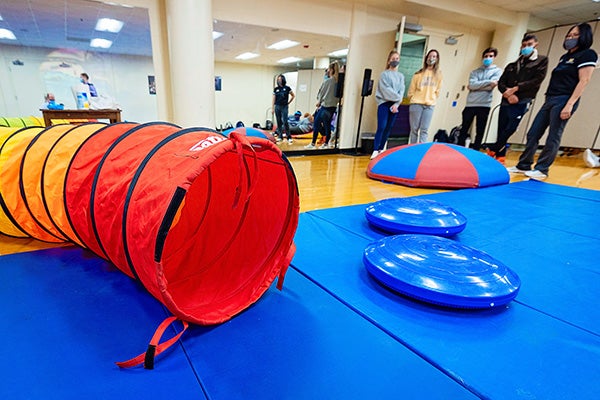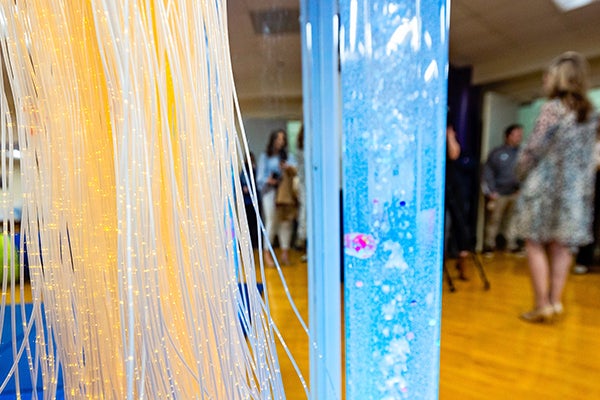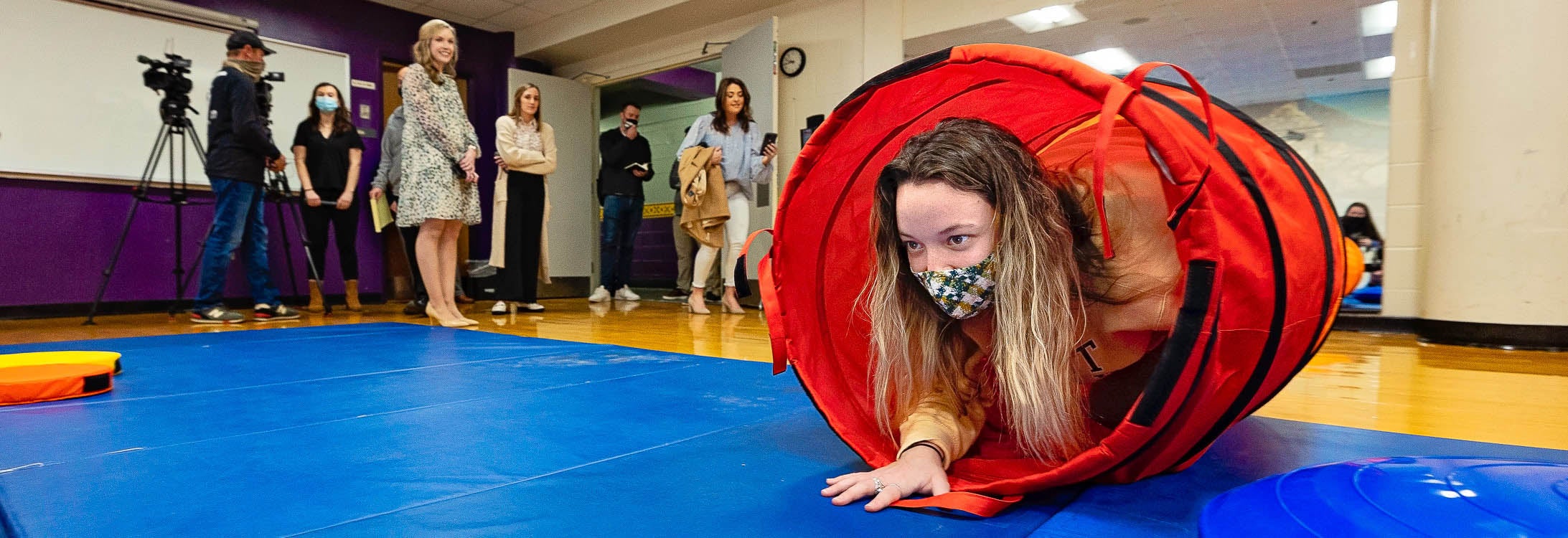SENSORY ROOM RELAUNCH
Inclusive space at Minges Coliseum reopens for Pirate fans
While significantly upping his exposure and comfort level to children with autism, Seth Collins has learned a motto in helping this semester in PeeDee’s Sensory Room in Minges Coliseum.

Dr. AJ An, right, and her students look at equipment in PeeDee’s Sensory Room, an inclusive space in Minges Coliseum.
“The more hands-on experience, the better,” said Collins, a senior in physical education within the Department of Kinesiology.
Collins and other students in the College of Health and Human Performance are gaining valuable experience in the sensory room that serves as an inclusive option for event attendees who might experience sensory overload.
PeeDee’s Sensory Room initially opened in February 2020 as the first of its kind at an ECU athletic venue and as part of the HHP design for disability initiative. This relaunch, led by Drs. David Loy, AJ An and Jennifer Hodgson, and in conjunction with Aces for Autism and ECU Athletics, on Feb. 12 coincided with the ECU men’s basketball annual autism awareness game.
“It really has shown what we can do with this partnership, and we have big plans, too,” Loy said. “We are going to purchase a sensory trailer, in the future, so that we can go and take this type of experience to the baseball field, to the football field and let our community maybe check it out for community events in uptown Greenville, as well. We’re real excited about this opportunity and think there are some really cool research, service and teaching opportunities for our university here.”
The sensory room also will be open for the Feb. 27 ECU women’s basketball game versus South Florida at 1 p.m.
Sensory overload occurs when one or more of the five senses — touch, taste, smell, sight and hearing — become overstimulated. A person can feel overwhelmed, unsafe or panicked in response to the sensory input.
“We have limited experience with autism and those with disabilities in our practicums, because we don’t know the kids we are going to get,” said Collins, a student teacher at Creekside Elementary School in Pitt County. “Here, we are getting real hands-on experience with kids with autism and learning about how to use sensory rooms. … This is great experience for us. A lot of PE programs don’t offer inclusion for autistic children, so we are working on trying to figure that out and how we can help promote inclusion in physical education.”

Colorful equipment hangs in PeeDee’s Sensory Room in Minges Coliseum.
Bobbie Robinson, co-founder of Aces for Autism, has seen the benefits of inclusion.
“We had some families that really had never experienced a university or sporting event where they recognized there were different needs,” she said. “They came into this space and you saw other families meeting each other and other moms sitting on the floor with their kid, knowing they are not in this journey alone. They came into this space and their child might have been having a rough time, but then there’s another mom or another dad in here that knows what you are going through. It’s an opportunity to create those friendships and that lasting bond.”
Sisters Leigh Fanning and Ellen Jeffreys Bland have contributed a total gift of $15,000 toward the initiative. Others can support the initiative by contributing to the HHP dean’s priority fund.
For Fanning, an observation at a game sparked an interest in supporting sensory plans.
“It’s really a neat opportunity, and I remember being at a football game and seeing someone with autism kind of shuttered up while at the game,” said Fanning, an ECU Board of Trustees member. “I thought this was something we would really like to do. We are thrilled to do it and wish the very best success. We want to keep the project moving along.”
For ECU Athletics, this relaunch is part of its mission to be welcoming to all fans.
“This is an exciting partnership that was initiated two years ago with athletics and the College of Health and Human Performance,” said Ryan Robinson, Pirate Club director and ECU executive associate athletics director for revenue generation. “We collaborated to find the best space and resources available and unfortunately, the pandemic forced us to postpone our vision. We are grateful that the sensory room is back in use. The entire idea behind the room is to provide a safe, friendly, inclusive environment for any individual who comes to our sporting events. We want to ensure all are comfortable and have a welcoming experience.”
